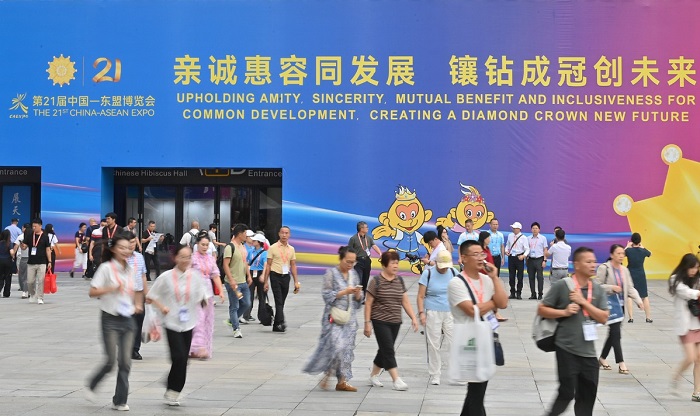China, ASEAN anticipate cooperation in technological, vocational education, training

This photo shows a view of Nanning International Convention and Exhibition Center in Nanning, South China's Guangxi Zhuang autonomous region, Sept 24, 2024. [Photo/Xinhua]
Over the past decade or more, under the strategic guidance of the leaders of China and ASEAN countries, China and ASEAN have jointly crafted a new chapter of practical and friendly cooperation. Since the establishment of the China-ASEAN comprehensive strategic partnership in 2021, significant progress has been achieved in advancing the China-ASEAN community with a shared future.
As China and ASEAN continue to enhance political mutual trust, bilateral exchanges and cooperation are also intensifying in various fields. Looking at the economic relationship between China and ASEAN, China has been ASEAN's largest trading partner for 15 consecutive years, and ASEAN has been China's largest trading partner for four consecutive years. Bilateral trade has not only promoted economic growth on both sides, but also provided new impetus and opportunities for Technological and Vocational Education and Training (TVET) development and cooperation.
Leaders of China and ASEAN countries highlighted on many occasions the importance of TVET development and international cooperation in improving national education level, adapting to the demand of globalized labor market and promoting economic development and technological innovation, and expressed the intention to strengthen practical cooperation in the field.
Particularly in recent years, China and ASEAN are collaborating wholeheartedly to enhance connectivity. Magnificent projects like the Jakarta-Bandung High-Speed Railway have been implemented and put into service, thereby escalating the demand for talents armed with an international perspective and professional skills.
At the end of 2023, China Daily and the ASEAN-China Centre organized The "Song of Our Homeland" China-ASEAN International Media Tour, which was launched at the Halim Railway Station of the Jakarta-Bandung High-Speed Railway in Jakarta, Indonesia. Coinciding with the 10th anniversary of the Belt and Road Initiative, the event aims to showcase the achievements of Chinese enterprises going overseas and tell stories of mutual benefit between China and ASEAN. They reported on key projects of Chinese enterprises such as Cainiao Cikarang Logistics Park in Indonesia, Singapore Meetsocial, vivo Indonesia, and Sensetime International in Singapore.
The voices of those Chinese brands on the international stage all tell the same story of how the Belt and Road Initiative has benefited people in participating countries and provided more job opportunities for the locals. All these projects not only support the local economy but also create employment opportunities for locals in various roles such as production, technical, engineering, and managerial positions, thus necessitating in-depth Technological and Vocational Education and Training (TVET) cooperation between China and ASEAN.
Since 2021, China-ASEAN education cooperation has entered the stage of high-quality development with deepening educational cooperation at all levels and fruitful outcomes yielded in talents cultivation and sci-tech collaboration. In 2023, ASEAN students take up almost 30% of the total number of international students in China and the number of Chinese students studying in ASEAN countries returns to the pre-pandemic level. Both sides are joining hands to move toward a more innovative, inclusive and sustainable educational partnership.
Facing a changing manufacturing landscape and increasing demand for skilled workers, the Chinese government is calling for investment in vocational education and looking for its partners in ASEAN to create a regional development community for deeper cooperation on vocational training and economic integration.
As China's latest initiatives in vocational education, including such concepts of "integration of industry and education", "integration of science and education", and "integration within vocational education" are widely accepted by ASEAN countries, we should further enhance cooperation in the following three aspects:
First, further synergize policies and resources for ASEAN-China educational cooperation, especially in critical areas such as vocational education. Second, continue to innovate brand programs in ASEAN-China vocational education cooperation to set more exemplary models and best practices in this area. Third, further enrich channels and deepen exchanges among youth, especially in areas related to pragmatic social development, so as to inspire the youth to discover, reflect on, and showcase the vivid bonds between ASEAN and China.
Zhang Yuyan is a deputy researcher at School of Foreign Languages, Remin University of China. Zhou Tongyao is a lecturer at Shijiazhuang Information Engineering Vocational College. The views don't necessarily reflect those of China Daily.
If you have a specific expertise, or would like to share your thought about our stories, then send us your writings at opinion@chinadaily.com.cn, and comment@chinadaily.com.cn.














